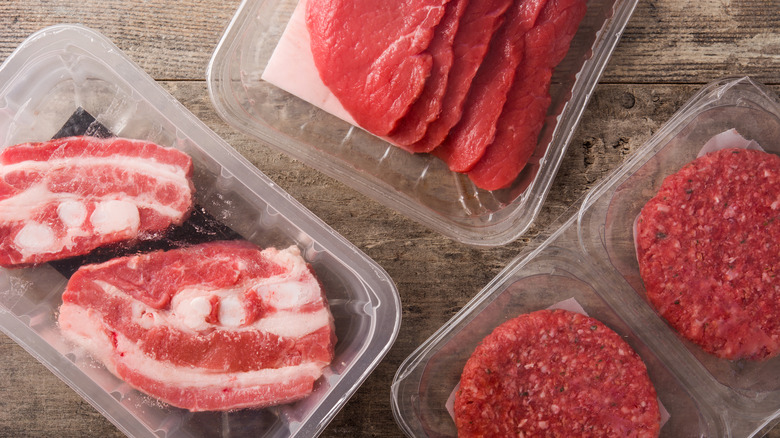Is It Okay To Pour The Juices From Raw Meat Down The Drain?
Preparing meat is a risky business. While following food safety rules can prevent food poisoning, the CDC reports nearly 48 million people still experience foodborne-related sickness annually — not to mention the 128,000 hospitalizations and 3,000 deaths. Because learning how to handle foods can quite literally be a matter of life and death, it's finally time to address whether discarding raw meat juices down the sink drain is actually okay or not.
Bacteria can exist naturally within food, but the University of Rhode Island explains that they can also form due to mishandling, whether through improper storage or cross-contamination. To minimize pathogens that cause food poisoning, the Partnership for Food Safety Education recommends always cleaning and sanitizing surfaces, separating raw from cooked foods, cooking meats completely, and chilling all produce and proteins to prevent premature spoilage. As for handling that saturated package of raw mince, there seems to be some uncertainty over what should be done.
The meat available in supermarkets is often neatly wrapped with a thin pad hiding underneath the protein. A means of soaking up any liquid (water and myoglobin, not blood), WebstaurantStore explains it also keeps meat fresh and prevents leaks before they happen. Yet, upon removing meat from its package, it's clear that not all the liquid is absorbed. While you might not think twice about pouring it down the drain, should you?
Pour it down the drain — as long as you properly sanitize
Unlike the grease from cooked meat, liquids from raw meat won't clog pipes. But just because pouring them down the drain won't wreak havoc on your sink, this doesn't mean it's a good idea. Believe it or not, this part of the kitchen is one of the most prominent breeding grounds for bacteria. So, while many believe dumping raw juices directly down the drain can minimize the spread of bacteria like E. coli, Food Safety News explains that after 20 minutes of coming into contact with the sink, bacteria can multiply to an extreme degree.
Naturally, the best way to contain the spread of bacteria is to make sure not to spill any juices and then swiftly dispose of them elsewhere. Following the advice of Residential Waste Systems, all packaging and trimmings should be thrown into a garbage bag and tied up before being placed in an outside bin. Though this method is the most effective at preventing cross-contamination (and lingering odors), you can still pour meat juices down the drain as long as you follow proper cleaning procedures.
To combat germs lingering in the sink, the USDA stresses using warm, soapy water to scrub down surfaces and then sanitizing with a homemade solution of 1 tablespoon of bleach mixed with 1 gallon of water to kill any remaining pathogens. It's also wise to use single-use towels or sponges to contain contaminants and guarantee a bacteria-free zone.

